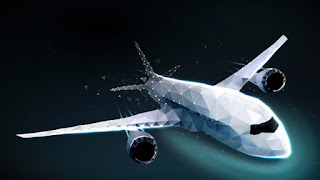AI In Aviation Market Overview, Dynamics, Key Players, Opportunities and Forecast to 2030
AI In Aviation Market Overview:
The AI in Aviation market refers to the application of
artificial intelligence (AI) technologies in the aviation industry. AI is being
used to improve various aspects of aviation operations, including aircraft
maintenance, flight operations, passenger experience, and air traffic
management. Here is an overview of the AI
in Aviation market:
Market Size and Growth:
The AI in Aviation market has been experiencing significant
growth in recent years and is expected to continue expanding in the coming
years. arket Research Future's report on the global AI in aviation market is
anticipated to expand at a striking CAGR of 39.10% during the forecast period
of 2022-2030 and reach the valuation of USD 5.47 Billion by the end of 2030.
Key Applications:
AI is being applied in several areas within the aviation
industry. Some key applications include:
a. Predictive Maintenance: AI algorithms analyze sensor data
from aircraft systems to predict maintenance needs and detect potential faults
or failures in advance. This helps airlines optimize maintenance schedules,
reduce downtime, and improve safety.
b. Flight Operations: AI is used to optimize flight routes,
fuel consumption, and scheduling. It helps airlines improve operational
efficiency, reduce costs, and enhance on-time performance.
c. Passenger Experience: AI-powered chatbots and virtual
assistants are being used to provide personalized customer service and handle
customer queries and requests. AI can also be used to analyze customer feedback
and sentiment to improve the overall passenger experience.
d. Air Traffic Management: AI is utilized to improve air
traffic control systems, enhance airspace management, and optimize aircraft
routing and sequencing. AI technologies enable more efficient use of airspace
and contribute to enhanced safety and capacity.
e. Security and Risk Management: AI algorithms can analyze
large volumes of data to detect anomalies and potential security threats. It
assists in enhancing security screening processes and risk management in
airports.
Key Players:
The AI
in Aviation market has attracted both established aviation companies and
technology firms. Major players in the market include Garmin Ltd., IBM
Corporation, Airbus SE, Boeing, General Electric, Amazon, Microsoft
Corporation, NVIDIA Corporation, Neurala Inc., Samsung Electronics, Micron
Technology, Xilinx, Thales S.A., Lockheed Martin Corporation, Northrop Grumman
Corporation, Pilot AI Labs, IRIS Automation, Innovative Binaries, Cognitive
Code and Searidge Technologies.
Data Analytics and Machine Learning: Data analytics and
machine learning techniques form the foundation of AI in Aviation. These
technologies enable the processing of vast amounts of data generated by
aircraft systems, sensors, and various aviation operations. Machine learning
algorithms are used to train models and make predictions or recommendations
based on historical data.
Autonomous Aircraft: The development of autonomous or
pilotless aircraft is a significant focus area within the AI in Aviation
market. AI technologies, including computer vision, deep learning, and sensor
fusion, are being utilized to develop autonomous capabilities in aircraft. This
has the potential to revolutionize air transportation and lead to more
efficient and safer flights.
Regulatory Challenges: The adoption of AI in the aviation
industry presents regulatory challenges. Safety and security concerns, ethical
considerations, and privacy issues need to be addressed to ensure the
responsible and safe integration of AI technologies.
Related Articles:
Hadoop Big Data Analytics Market
Public Safety Solution For Smart
City Market
Future Outlook:
The AI in Aviation market is poised for continued growth and
innovation. Advancements in AI, including the emergence of explainable AI and
reinforcement learning, are expected to further enhance the capabilities and
applications of AI in aviation. Additionally, the increasing focus on
sustainability and environmental impact may drive the adoption of AI
technologies to optimize fuel efficiency and reduce carbon emissions.
It's important to note that the AI in Aviation market is
evolving rapidly, and new applications and advancements are continuously being
developed. The market's growth and direction will be influenced by factors such
as technological advancements, regulatory frameworks, industry collaborations,
and the demand for improved efficiency and safety in air transportation.


Comments
Post a Comment